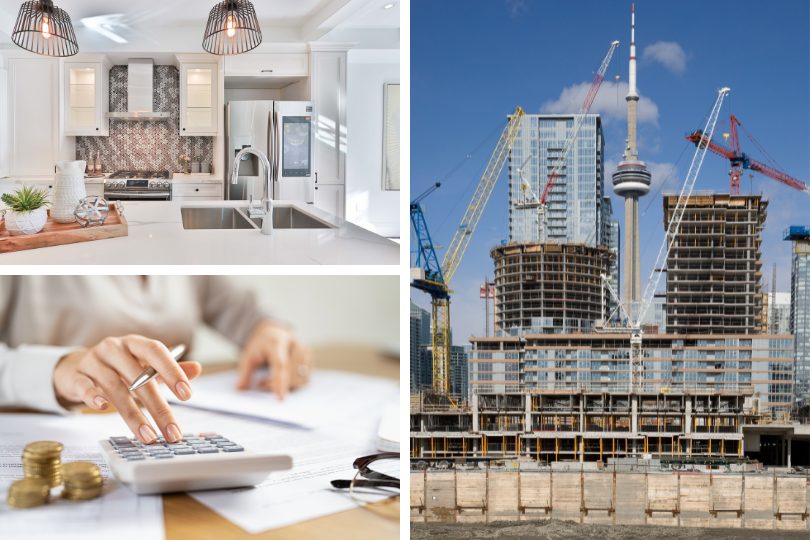
Buying a pre-construction condo is incredibly exciting. It gives buyers the chance to live in a brand new home that has never been lived in before, so it’s completely fresh and clean. Pre-construction condos can be customized to suit homeowners’ personal style, from the floor plan and layout to the flooring and cabinetry. Plus, it’s thrilling to watch your new home come to life before your eyes.
However, it’s easy to get caught off guard with the financing of a pre-construction home. To make the process a little bit easier, we’re breaking down the financial process and explaining what you need to know about deposit structure, the cooling-off period, occupancy fees, and closing costs. Costs vary depending on the value of the home, municipality, and the builder, so read on to learn more.
Deposit Structure
The down payment for resale condos can be as little as 5%, however pre-construction condos typically require 20%. The good news is that it gets paid in installments, giving the buyer more time to save up. A typical deposit structure is $5,000 with the offer, and then 5% increments at 30 days, 90 days, 180 days, and at final occupancy. The exact timing depends on the builder, and some developers even offer pre-launch deposit structures that are even more manageable, for example, your deposit may be split over 365 days instead of 180. Deposits often tend to be higher at the beginning of a project as banks and lenders require this, however deposit structures may become more flexible closer to completion, where a builder may be willing to negotiate your fee structure.
Cooling-Off Period
After putting down a deposit on a pre-construction condo, buyers are given a “cooling-off period.” During this time the buyer has some time to re-evaluate their purchase decision. Typically, the cooling-off period is 10 days in Ontario, so this would apply for all Toronto condos. At this time, the buyer should organize their finances and ensure they’re ready to move forward with the purchase. They should also take advantage of this time to review their Agreement of Purchase and Sale with a real estate lawyer to make sure they fully understand the builder clauses. If a buyer changes their mind during the 10-day cooling-off period, they are able to back out of the contract and have the deposit returned without deduction.
Occupancy Fees
After the condo is built and the buyer’s unit becomes available to move into, there is a period called interim occupancy. During this period, which can last a few weeks to several months, the buyer can take possession of their unit without actually owning it. This is because titles can’t be transferred until the whole building is complete. During this time, rather than paying their mortgage, the buyer will pay occupancy fees. The occupancy fee is made up of three parts: interest (usually 1%) on the unpaid balance of the purchase price of the condo, an estimate on the municipal taxes for the unit, and a projected common expense contribution to keep the building running. The fee is usually charged monthly. Many buyers will elect to take advantage of the interim occupancy period, as the payment may be less than their rent, and to take advantage of moving into their unit. A downside is that the building’s amenities may not yet be available to use, however the buyer can begin leasing out their space if they choose to do so.

Closing Costs
Closing costs are additional costs that the buyer will need to pay between the time they make their offer and the day they close. These costs include home inspection fees, legal fees, land transfer taxes, etc. Buyers should try to put aside an additional 1.5% to 4% of the purchase price of their homes, in order to cover these closing costs. Additional closing costs include: development and educational levies, a New Home Warranty Plan enrolment fee, utility hook-up fees, assignment fees (if you sell before final closing) and occupancy fees. These additional costs are builder- and project-specific, and some may even be included in the sale price of the unit.
It’s also important to keep in mind that when buying a pre-construction condo, buyers will need to contribute at least two months of condo fees to the condo’s reserve fund. Pre-construction condos are also subject to HST, which builders often factor into the purchase price of the unit and pay on behalf of the buyer. If a buyer is planning to live in the unit, they may qualify for an HST rebate.
Timing
When it comes to pre-construction condos, delays happen – and it’s not uncommon. Builders are permitted two extensions that last up to 120 days each. After that period, the developer must set a new date, and buyers are eligible for delayed closing compensation. If another year passes, the buyer can cancel their agreement.
With so many fees and closing costs, it’s no surprise that many pre-construction condo buyers feel overwhelmed at closing time. However, with due diligence and sound legal advice, buyers can confidently navigate the challenge of home financing and attain the home of their dreams.
Do you have any questions about purchasing a pre-construction condo? Connect with BAZIS on social media (Facebook, Twitter or Instagram) and let us know!
